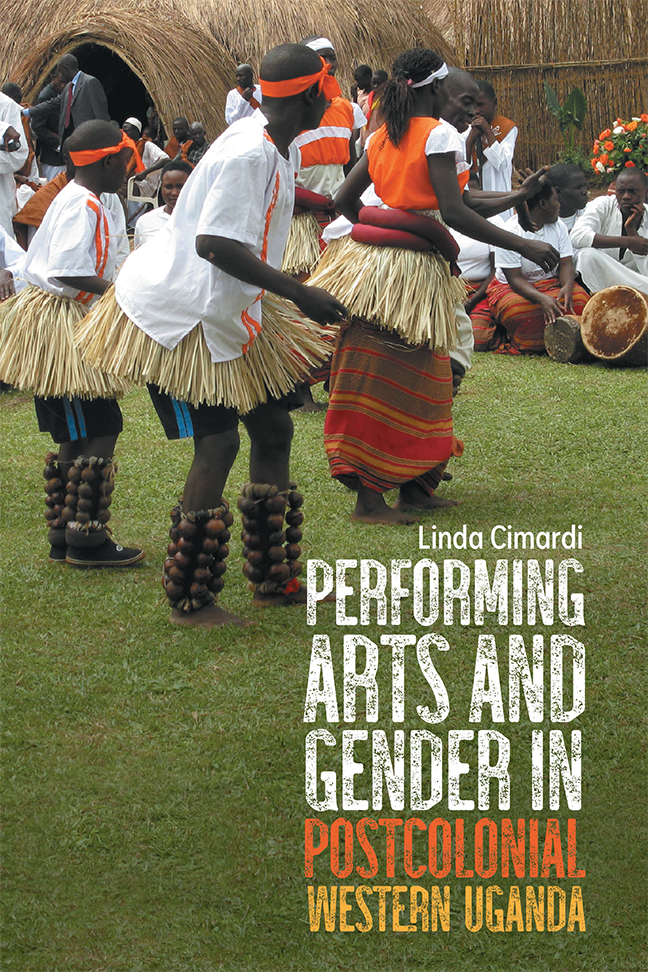Book contents
- Frontmatter
- Contents
- List of Illustrations
- Foreword
- Acknowledgments
- Note on Language
- Note on the Musical Examples
- Note on Online Audio and Video Material
- Prelude: Encountering Local Culture in Western Uganda
- Introduction: Approaching Gender and Performing Arts in Bunyoro and Tooro
- One “Traditional Dance Preserves Culture and Shows People How to Behave”: Runyege, MDD, and Gender
- Two Singing Marriage, Runyege, and Labor
- Three “Women Aren't Supposed To”: Instrument Playing in the Past and Today
- Four Shaking the Hips, Stamping the Feet: The Runyege Dance
- Five Narrating and Representing Local Culture: Theater in Songs and Dances
- Six Trans-Performing and Morality in Cultural Groups
- Postlude: Gendering Culture
- I Glossary of Terms in Runyoro-Rutooro
- II Historical Recordings from Bunyoro and Tooro
- Author's Interviews
- References
- Index
Six - Trans-Performing and Morality in Cultural Groups
Published online by Cambridge University Press: 17 December 2023
- Frontmatter
- Contents
- List of Illustrations
- Foreword
- Acknowledgments
- Note on Language
- Note on the Musical Examples
- Note on Online Audio and Video Material
- Prelude: Encountering Local Culture in Western Uganda
- Introduction: Approaching Gender and Performing Arts in Bunyoro and Tooro
- One “Traditional Dance Preserves Culture and Shows People How to Behave”: Runyege, MDD, and Gender
- Two Singing Marriage, Runyege, and Labor
- Three “Women Aren't Supposed To”: Instrument Playing in the Past and Today
- Four Shaking the Hips, Stamping the Feet: The Runyege Dance
- Five Narrating and Representing Local Culture: Theater in Songs and Dances
- Six Trans-Performing and Morality in Cultural Groups
- Postlude: Gendering Culture
- I Glossary of Terms in Runyoro-Rutooro
- II Historical Recordings from Bunyoro and Tooro
- Author's Interviews
- References
- Index
Summary
“Through our music and dance we preserve good behaviors and good morals.”
—(Answer to a question in an anonymous questionnaire submitted to Excel Secondary School students. June 24, 2011)“When you are given a talent you need to utilize it. God has given me the gift to dance mugongo. So, that is my talent. As a man, I used it to dance mugongo better than the women.”
—(interview with Deosi, a man dancing women's mugongo. June 12, 2011)“When I danced runyege, people thought that maybe I am bwatububiiri [hermaphrodite]. That's what they thought because it was beyond their understanding, and the way I could do it … very perfectly and energetically.”
—(interview with Ruru, a woman dancing runyege men's part. August 20, 2018)From the answers to the anonymous questionnaire I submitted to students in various secondary schools in Bunyoro and Tooro, as well as from numerous other research participants, it emerged that the value given to traditional repertoires as carriers of local culture was often interpreted in moral terms, as repositories of positive examples of customs and modes of behavior, individually and with others. Of course, this understanding of local culture as positive and moral was not universal among the youth nor in the broader society, who also expressed opinions about it as backward and morally ambiguous. However, the understanding of local tradition as morally good seemed to be the prevailing position in Bunyoro and Tooro, especially among persons involved in traditional performing arts, and it dominated discourses of local identity and gender in relation to both the national and international postcolonial contexts. My research participants understood local tradition as indigeneity and old roots, thus tying together spatial and temporal dimensions. As outlined in the Introduction, Nyoro and Tooro identity locates itself in the ancient local, and more broadly African, tradition, in opposition to the West as a foreign dominator whose influence is still present. In this context, a very widespread view is that traditional repertoires convey a model of reference that, on the one hand, is perceived as morally good in opposition to some Western customs that are deemed dissolute (like some aspects of women's emancipation and dressing) and, on the other hand, is reassuring in these contemporary times, troubled by challenging instabilities concerning health, economy, politics, and human relations.
- Type
- Chapter
- Information
- Performing Arts and Gender in Postcolonial Western Uganda , pp. 190 - 220Publisher: Boydell & BrewerPrint publication year: 2023



